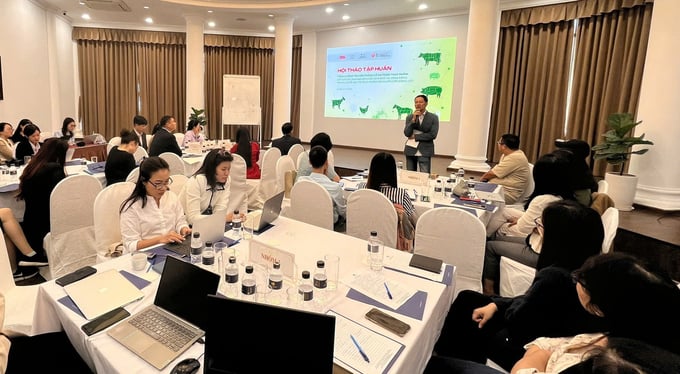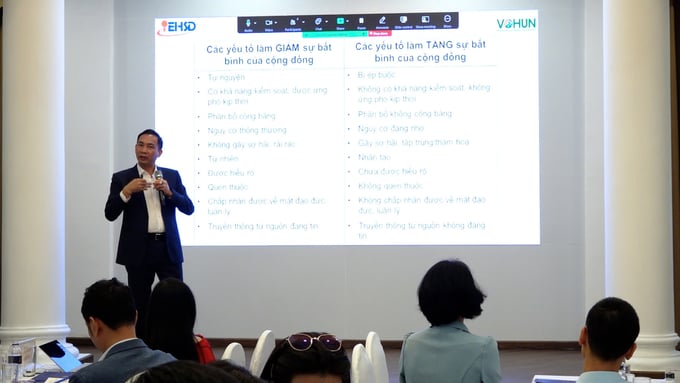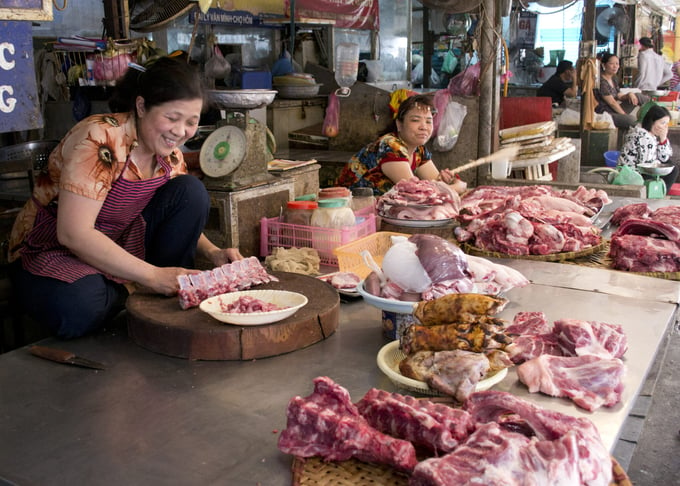December 5, 2025 | 10:09 GMT +7
December 5, 2025 | 10:09 GMT +7
Hotline: 0913.378.918
December 5, 2025 | 10:09 GMT +7
Hotline: 0913.378.918

The training workshop on enhancing communication about food safety took place on the morning of December 5, in Hanoi. Photo: Quoc Nhat.
On December 5, the Vietnam Agriculture Newspaper, in collaboration with the International Livestock Research Institute (ILRI), organized a training workshop titled “Enhancing communication on food safety: Connecting researchers, journalists, and communities in the animal-sourced food value chain.”
The workshop aimed to emphasize the importance of food safety in the food supply chain while providing practical communication strategies to convey clear and accurate messages to the public.
Journalists, reporters, and editors attending the event had the opportunity to explore key topics such as food safety and food systems, principles of effective risk communication, and challenges faced by journalists in reporting on food safety, guided by experienced experts.
Welcoming the journalists to the workshop, Mr. Le Trong Dam, Deputy Editor-in-Chief of Vietnam Agriculture Newspaper, stated "In the food value chain, food safety emerges as a critical issue requiring interdisciplinary coordination and active involvement from researchers, regulatory agencies, and especially the media. Through this workshop, we aim to build a core journalism network and raise community awareness about food safety."
The Deputy Editor-in-Chief of Vietnam Agriculture Newspaper expressed hope that close collaboration between researchers and the media would contribute to substantial changes in this vital field.

Professor Pham Duc Phuc moderated the discussion session on food safety risk communication. Photo: Nguyen Thuy.
“Vietnam faces numerous issues such as food containing chemicals, microbiological contamination, and misinformation about food origins,” affirmed Dr. Pham Duc Phuc, Director of the Institute of Environmental Health and Sustainable Development. He further emphasized that effective risk communication requires transparency, understanding and empathy toward the target audience, timely delivery of information, and the use of scientific evidence to strengthen messages.
Additionally, the role of communication chains for animal-based food products is crucial in the current context, particularly in pork production. Appropriate interventions and communication solutions are needed to ensure the safety of these supply chains. Encouraging community participation is also essential in building public trust. Moreover, it is important to address uncertainties, controversial issues, and handle negative information tactfully.

ILRI has implemented food safety interventions to mitigate risks at traditional markets. Photo: CGIAR.
Alongside this, the panel discussion on innovative approaches in food safety communication focused on clarifying the connection between risk, scientific information, and communication. It also aimed to propose more specific and effective solutions for risk communication in food safety.
Dr. Freg Unger, Regional Representative of ILRI East and Southeast Asia, emphasized during his closing remarks that discussions around food safety often focus heavily on chemical contamination, overlooking the significant threats posed by biological contamination. Bridging this gap requires more than just data presentation as it calls for innovative, and targeted communication strategies for the audience, whether they are rural farmers, urban consumers, or decision-makers.
"Another key takeaway is the role of collaboration. Panelists highlighted that researchers and journalists have unique strengths, but their impact is increased when they work together. By simplifying scientific terms, and by countering misinformation with accessible, evidence-based messages, we can begin to change the narrative around food safety.", Dr. Freg stated.
Experts highlighted that an ideal food system should meet consumer demands for food safety and quality while promoting socio-economic welfare, reducing ecological pressures, and enhancing resilience to shocks.
Moreover, individual attitudes and motivations, taste preferences, convenience, and health-related perceptions play a decisive role in consumers' food choices.
There is a close relationship between consumer behavior and their food environment, as this environment plays a crucial role in determining food choices. Consumers eat what is available to them; therefore, the diversity of food options shapes consumer behavior.
Translated by Kieu Chi

(VAN) As of 2025, the ASEAN region has a total of 69 ASEAN Heritage Parks recognized across its 10 member states. Among them, Viet Nam contributes 15 ASEAN Heritage Parks.

(VAN) Yok Don National Park has high biodiversity with numerous endemic plant and animal species, and it is also the only dipterocarp forest ecosystem conservation area in Viet Nam.

(VAN) Viet Nam and Brunei signed two important MOUs on fisheries and IUU, expanding cooperation in agriculture, the environment, and Halal exports, aiming to substantively implement joint projects.

(VAN) The Viet Nam Coconut Association worked with the International Finance Corporation (IFC) and businesses to promote the supply chain, enhance competitiveness, and develop the coconut industry sustainably.
![Hue aims for Net Zero: [2] Pioneering low-emission tourism](https://t.ex-cdn.com/nongnghiepmoitruong.vn/608w/files/huytd/2025/12/04/0633-dulichzero-4-095634_236-161125.jpg)
(VAN) The ancient capital of Hue has developed Net Zero tourism products and models, aiming to reduce carbon emissions and pioneer the establishment of Viet Nam's green tourism destination.

(VAN) C.P. Viet Nam has announced the successful completion of its goal to plant 1.5 million trees during the 2021-2025 period, a key milestone within company's long-term ESG strategy and its roadmap for emission reduction.

(VAN) This is an initiative of MAE aimed at creating a unified coordination mechanism to implement agricultural cooperation programs with developing countries.